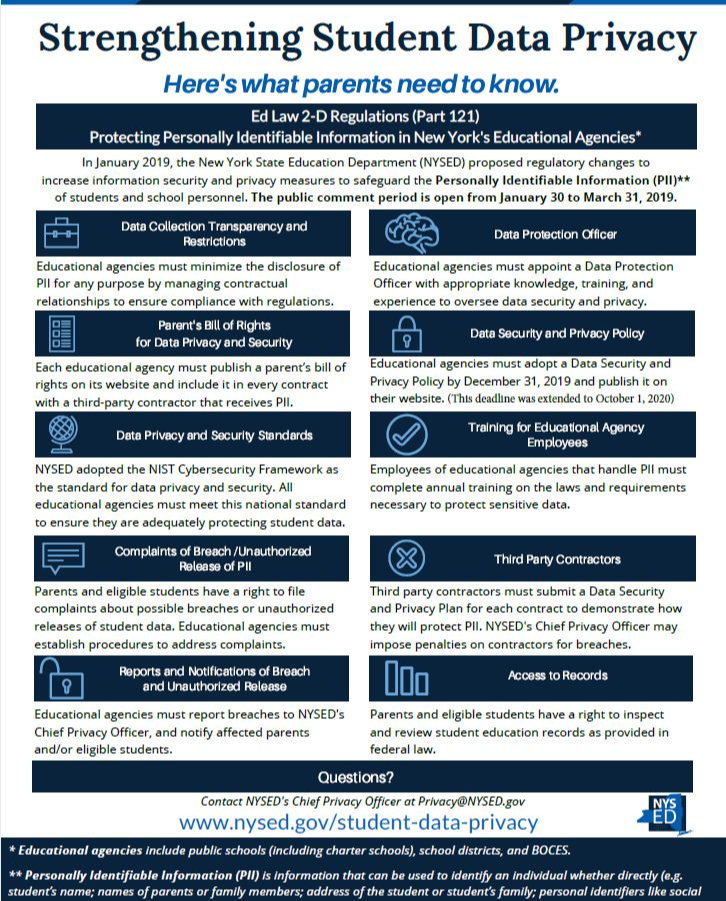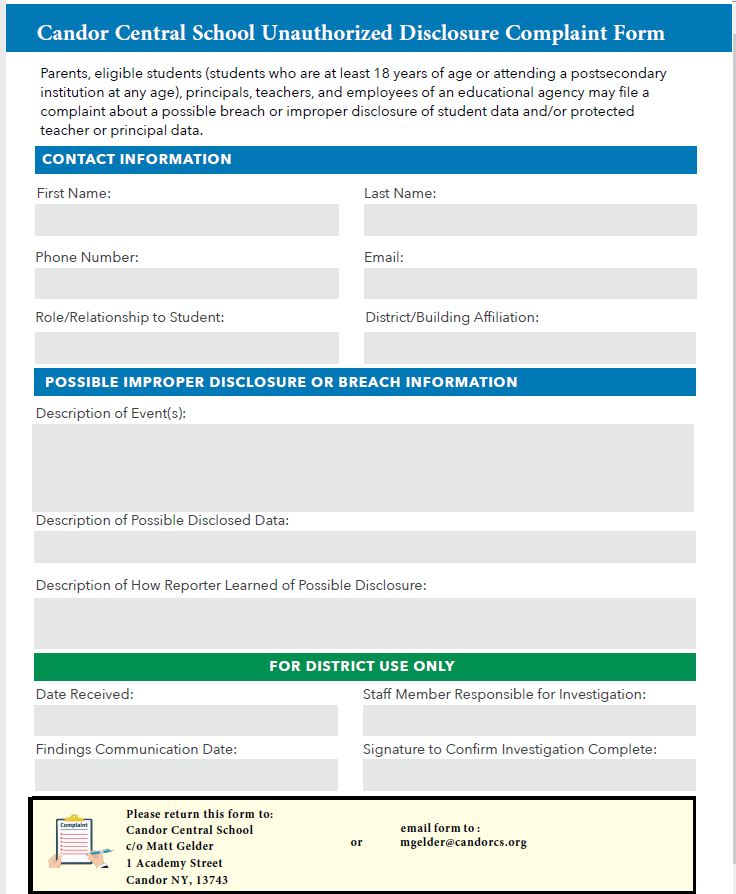Digital Privacy
This page contains the four mandatory items that should be hosted on the district's website, in addition to other information that, while not required by the law, are recommended to include fo rthe benefit of the public. To view any of these elements, please click on the respective link(s) below.
Child Internet Protection Act (CIPA)
The school is required by CIPA to have technology measures and policies in place that protect students from harmful materials including those that are obscene and pornographic. This means that student email is filtered. Mail containing harmful content from inappropriate sites will be blocked. -- CIPA - fcc.gov/consumers/guides/childrens-internet-protection-act
Children’s Online Privacy Protection Act (COPPA)
COPPA applies to commercial companies and limits their ability to collect personal information from children under 13. By default, Google advertising is turned off for Apps for Education users. No personal student information is collected for commercial purposes. This permission form allows the school to act as an agent for parents in the collection of information within the school context. The school’s use of student information is solely for educational purposes. -- COPPA - https://www.ftc.gov/legal-library/browse/rules/childrens-online-privacy-protection-rule-coppa
Family Educational Rights and Privacy Act (FERPA)
FERPA protects the privacy of student education records and gives parents rights to review student records. Under FERPA, schools may disclose directory information (name, phone, address, grade level, etc...) but parents may request that the school not disclose this information.The school will not publish confidential academic records (grades, student ID #, etc...) for public viewing on the Internet.
The school may publish student work and photos for public viewing but will not publish student last names or other personally identifiable information.
Parents may request that photos, names and general directory information about their children not be published.
Parents have the right at any time to investigate the contents of their child’s email and Apps for Education files.
-- FERPA - http://www2.ed.gov/policy/gen/guid/fpco/ferpa
Protection of Pupil Rights Amendment (PPRA)- See info below.
Education Law 2-d
As a parent, you may be aware the New York State Education Department is making a stronger push to monitor the efficacy of school districts in meeting the mandates set forth by part 121 of Education Law 2-d ("Ed Law 2-d). These actions are being taken by the state to ensure that student (and some teacher) data privacy is being regarded with the utmost security, both in-district and by approved third parties. Part of this law requires that school districts have written contracts with each vendor of a service that are utilized by the district. For teachers, this means that all services used must be approved by the District before they are allowed to be used.
Please note that this only applies to student data. Teachers should complete the following form to request the use of a new technology tool that might share student PII: Submit Request for Tech Tool Approval
Student Directory Information Policy 5110
Data Security and Privacy Policy 5120
Candor CSD Software Inventory- We are in the process of migrating all of the software in the "Approved Tech Services at Candor" (below) into this inventory. It will take some time to get all of the software used by the district in this new tool.
Teachers and Staff- If you would like to request access to some software please fill out this form https://sdpc.a4l.org/new_request.php?districtID=12361
Approved Tech Services at Candor |
|---|
Inventory of third parties who have access to student data. |
These products can be used with students immediately. An agreement has already been signed with the vendor, or their privacy policy states that they do not collect student PII or do so in a manner that is compliant with Education Law 2-d.
If you believe there has been an unauthorized breach of student PII, please report the incident by either:
Filling out the online Incident Response Form
or
Clicking on the image above to print out the form and mail it to the address at the bottom of the form.
Upon Receipt of your complaint you will receive acknowledgement via email and we will initiate an investigation. We will provide you with the findings of our investigation within 60 days of the receipt of your complaint.
Protection of Pupil Rights Amendment
The Protection of Pupil Rights Amendment (PPRA) affords parents certain rights regarding our conduct of surveys, collection and use of information for marketing purposes, and certain physical exams. These include the right to:
Consent before students are required to submit to a survey that concerns one or more of the following protected areas if the survey is funded in whole or in part by a program of the U.S. Department of Education or is issued by a “third party”:
Political affiliations or beliefs of the student or student’s parent’
Mental or psychological problems of the student or student’s family;
Sex behavior or attitudes’
Illegal, anti-social, self-incriminating, or demeaning behavior’
Critical appraisals of others with whom respondents have close family relationships;
Legally recognized privileged relationships such as with lawyers, doctors, or ministers’
Religious practices, affiliations, or beliefs of the student or parents; or
Income, other than as required by law to determine program eligibility.
Receive notice and an opportunity to opt a student out of:
Any other protected information survey, regardless of funding;
Any non-emergency, invasive physical exam or screening required as a condition of attendance, administered by the school or its agent, and not necessary to protect the immediate health and safety of a student, except for hearing, vision, or scoliosis screenings, or any physical exam or screening permitted or required under State law; and
Activities involving collection, disclosure, or use of personal information obtained from students for marketing or to sell or otherwise distribute the information to others.
Inspect, upon request and before administration or use:
Protected information surveys of students;
Instruments used to collect personal information from students for any of the above marketing, sales or other distribution purposes; and
Instructional material used as part of the educational curriculum.
These rights transfer from the parents to a student who is 18 years old or an emancipated minor under State law. Parents who believe their rights have been violated may file a complaint with:
Family Policy Compliance Office
U.S. Department of Education
400 Maryland Avenue, SW
Washington, D.C. 20202-8520
Responsible/Acceptable Technology Use Policy
Students are responsible for following the Responsible Use Policy found in the student handbook.
Information on Google Workspace
What is Google Workspace?
Google Workspace provides a robust, low cost (actually free), cloud-based platform that is a good fit for achieving district teaching and learning goals. Google Workspace is an integrated communication and collaboration solution, hosted by Google and managed by the Candor Central School District. Google Workspace will provides the ability for CCSD students, faculty and staff to communicate, store files, and collaborate in real time from school, work, or home, all within a secure online environment.
What about privacy?
Google Apps is governed by detailed privacy policy and security measures which we have reviewed. The CCSD is satisfied that these measures appropriately protect the privacy of its users of these tools. Under our Terms of Service Agreement, Google, like the CCSD, is obligated to comply with FERPA regulations. Additional information about GAFE security and privacy may be found here.
What assurances has Google given the CCSD that they will not collect data on my student?
The CCSD has a signed an agreement with Google through TSTBOCES based on these education terms (please see Section 7). CCSD Google Workspace is compliant with the Family Educational Rights and Privacy Act (FERPA), Children's Online Privacy Protection Act (COPPA), and Edlaw 2-d.
How does Google Apps for Education and CCSD protect student privacy?
Google is a Student Privacy Pledge signatory. This pledge holds Google accountable to:
Not sell student information
Not behaviorally target advertising
Use data for authorized education purposes only
Not change privacy policies without notice and choice
Enforce strict limits on data retention
Support parental access to, and correction of errors in, their children’s information
Provide comprehensive security standards
Be transparent about collection and use of data.
There are NO ADS in Google Apps for Education.
Google Apps for Education services do not collect or use student data for advertising purposes or create advertising profiles.
Additional Information regarding Google Apps Privacy: https://www.google.com/edu/trust/
Do Chromebooks come with Internet Filtering Software?
Yes. Chromebooks are filtered both in and out of district on any network. CCSD uses GoGuardian to remain in compliance with the Children's Internet Protection Act.
Where can I submit other questions regarding this initiative?
Additional questions can be submitted via email to mgelder@candorcs.org.


